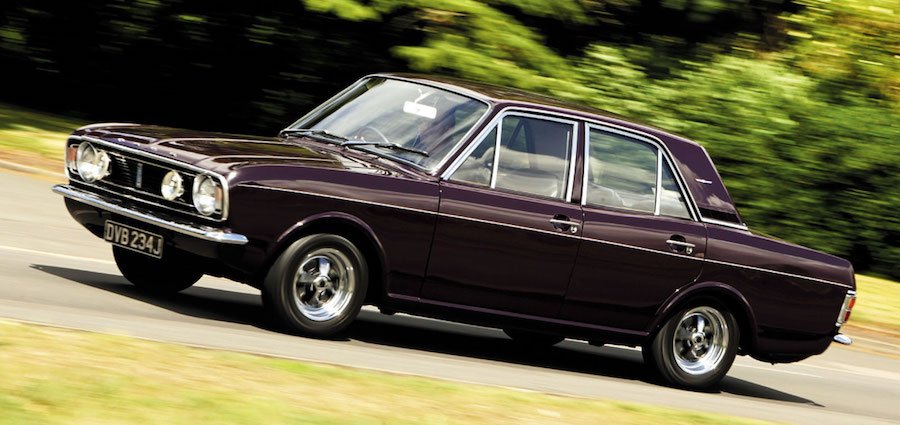Around 2.3 million new cars were sold throughout the UK last year (final figures are still to be announced). To the uninitiated, that figure may sound remarkably high, but it actually represents something of a dissapointment, being 2.8% down on the year prior and 14.6% of the all time peak – 2.7m – set in 2016.
Myriad factors are to blame, ranging from powertrain confusion and WLTP-related production restrictions to Brexit uncertainty. Nevertheless, the marketplace remains vibrant, filled with innovation and exciting, high-quality products.
And as the decade ends, it's an interesting exercise to see how different things were in this country half a century ago, another point at which the future seemed to be full of uncertainty. Could the brewing social and political troubles at home be remedied? What consequences would a potential entry into the European Common Market bring? And could we boost our global automotive exports?
In 1969, Brits bought a total of 965,410 new cars. Even accounting for the enormous, uncontrolled population growth that has occured since then, that's a far smaller market than today; it meant about 1.7% of the population had taken delivery of a car that year, as opposed to 3.4% in 2019. And glory be, not an SUV in sight!
Most striking about the figures, though, is the domination of Britain's home manufacturers. It's almost inconceivable for younger generations that British companies could dominate in this field, seeing as our mainstream domestic industry today comprises Indian-owned Jaguar Land Rover alone.
Who would have thought that possible at the start of the 1970s, when 89.6% of cars sold here were Britsh? Today, it's just 14.9% – although it should be noted that some of these were built abroad, and a decent number of foreign-brand cars were built here.
Appearing on the podium in 2019 were Ford (10.23%), Volkswagen (8.61%) and Mercedes-Benz (7.50%). In 1969, it was British Leyland (40.25%), Ford (27.35%) and strike-hit Vauxhall (11.67%).
This most likely means Ford was the true leading brand 50 years ago, because Leyland was in fact a newly created group comprising a melange of brands: Austin, Daimler, Jaguar, Land Rover, MG, Mini, Morris, Riley, Rover, Triumph, Vanden Plas and Wolseley.
Around a third of the cars sold by the group that year were variants of BMC's ADO16 car family from 1962, models from which were sold under six different marques, making this single design the top-seller. It was followed by Ford's long-running Cortina and new, smaller Escort.
With 9.67%, the fourth-best selling firm in 1969 was the Rootes Group, which had been taken over by the American company Chrysler two years before and ran Hillman, Humber, Singer and Sunbeam.
Rounding out the top 10 were foreign companies. Leading among them was Fiat, with 2.16% – and that low only because it cound't fulfil all of its orders in the latter half of the year. The Italian company has since experienced a depressing decline to just 1.45%, while the German marques have grown hugely to absorb the former shares of the now-defunct British badges.
Next up were Renault (2.09%, now 2.52%); Volvo (0.76%, now 2.42%); Simca (a French badge that disappeared in 1978); Alfa Romeo (0.16%, now 0.15%); and Honda (0.15%, now 1.90%).
The enormous changes that occured over the next half-century are even clearer to see in the 2019 top 10: in fourth place is BMW (7.20%), which in 1969 sold fewer cars here than Lotus. Skipping over Vauxhall, we come to Audi (6.02%), whose negligible sales in 1969 were accounted for by just two models. It's followed by Toyota (4.65%, up from 0.13%); Kia (4.27%), which wouldn't arrive in the UK until 1991; Nissan (4.03%), having landed in 1968; and Hyundai (3.68%), a company that wouldn't even build its own car until 1975.
Indeed, by 1990, just two decades later, Britain's car industry had all but collapsed, with the incredible growth of the Japanese, then German, then Korean industries allowing these brands to captalise.
Who knows what the table could look like in 2040, by when most developed countries are expected to have banned the sale of petrol and diesel cars? The absence of some major, historic brand names would not be a huge surprise, while a number of new names should be expected. How the 'legacy auto makers' will compete with electric car start-ups, not to mention Tesla, and the automotive rise of China, will be fascinating to witness.
Nouvelles connexes

